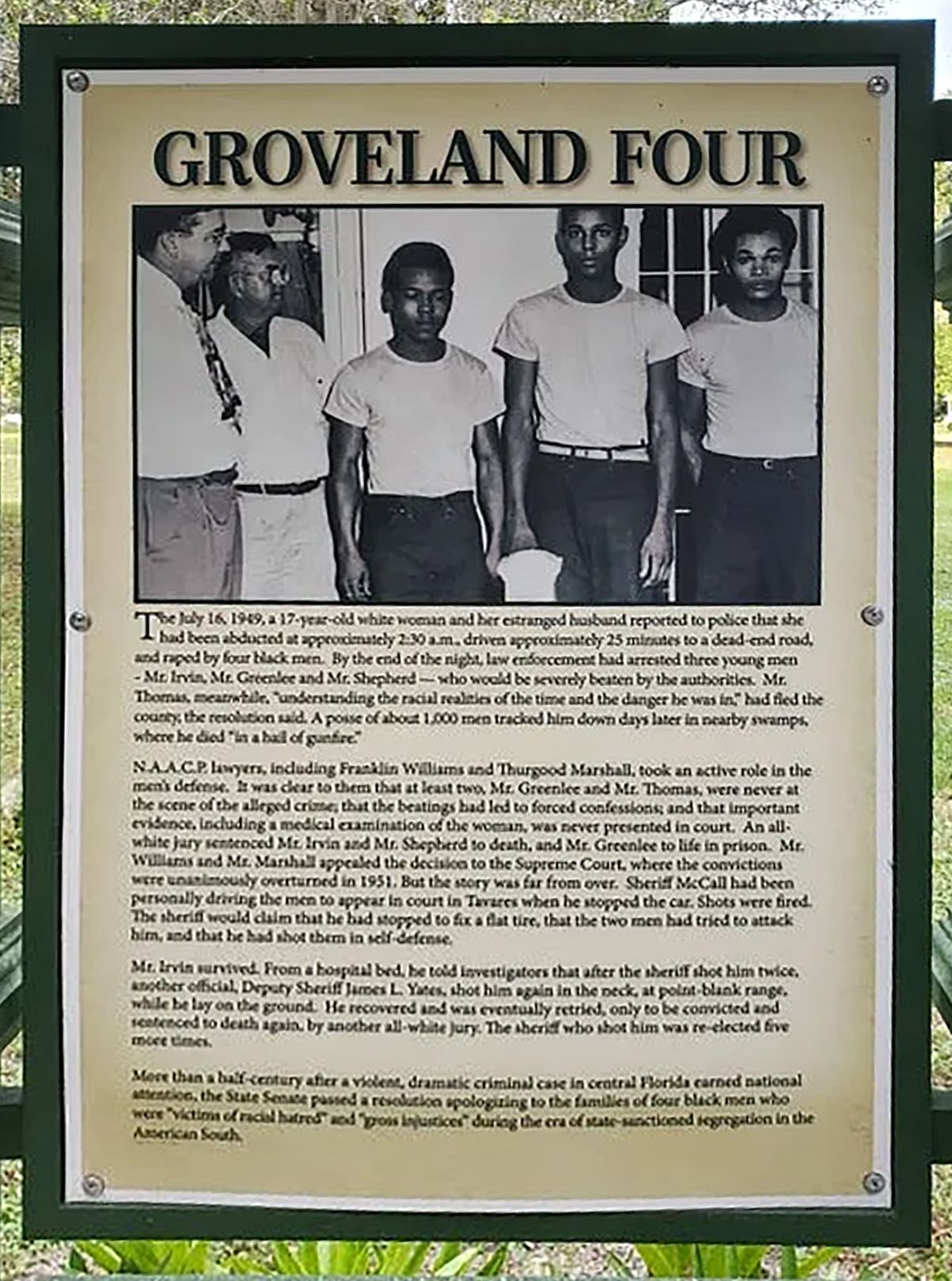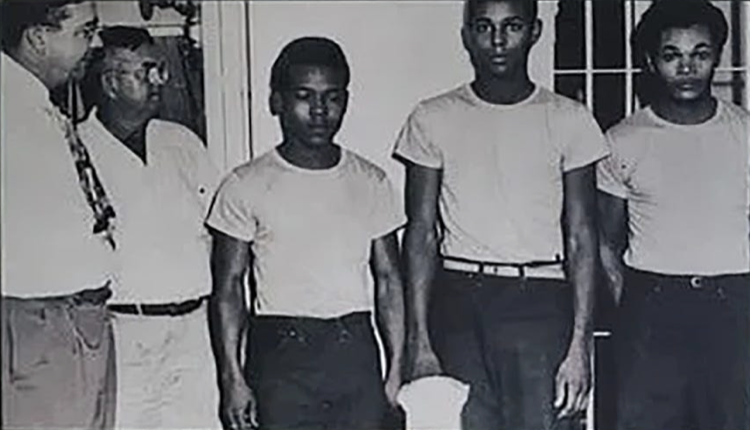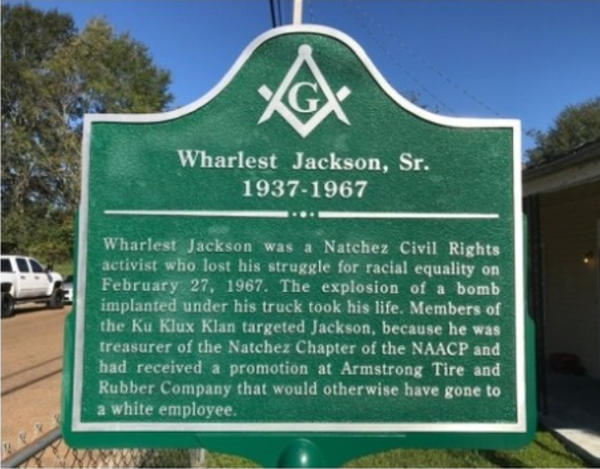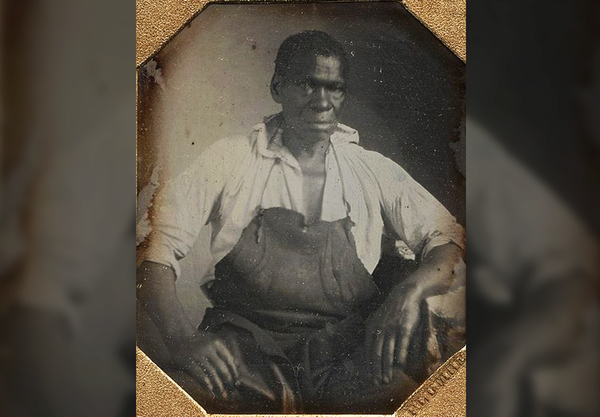Ron DeSantis knows about the Groveland Four; but Florida’s Board of Education fails to mention it in Florida’s history curriculum. One of DeSantis’s first acts during his first term as Governor was to issue a pardon for the Groveland Four. In his own words, he acknowledged their history had been wrongly told for seventy years. Now he’s removed their history entirely.
“For seventy years, these four men have had their history wrongly written for crimes they did not commit. As I have said before, while that is a long time to wait, it is never too late to do the right thing. I believe the rule of law is society’s sacred bond. When it is trampled, we all suffer. For the Groveland Four, the truth was buried. The Perpetrators celebrated. But justice has cried out from that day until this. I would like to thank CFO Patronis, Attorney General Moody, and Agriculture Commissioner Fried for their support.” —Gov. Ron DeSantis, 2019
Much has been made about the new Florida’s State Academic Guidelines for Black history. To be fair, they are far more wide-ranging and inclusive than one might gather without reading the document. They also omit critical portions of Black history, including the Compromise of 1877 and Posse Comitatus, which combined ended the Reconstruction Era. There’s no mention of the partus sequitur ventrem laws, which reshaped enslavement, defining who was a slave. The Groveland Four was left out, presumably because white Floridians don’t look good.
Early in my writing career, I met a former classmate from Fisk University at a funeral. I hadn’t seen Malcolm Cunningham, an attorney in South Florida, for thirty years. He was familiar with some of my writings and made a suggestion that changed my perspective on history. He told me to find the non-fiction book, “Devil in the Grove: Thurgood Marshall, the Groveland Boys, and the Dawn of a New America. It was written by Gilbert King and won a Pulitzer Prize. I heartily recommend it to all; now on with the story.


On July 16, 1949, seventeen-year-old Norma Padgett claimed four Black men raped her and assaulted her husband in Groveland, Florida. Groveland was aptly named, mainly consisting of citrus groves. Shortly after she complained to authorities, two suspects, Walter Irvin (twenty-two) and Samuel Shepherd (twenty-two), were arrested and taken to a secluded spot. The perpetrators beat the pair with blackjacks, hit, and stomped them until they got a confession from Shepherd; Irvin never confessed. They were asked if they had picked up a white girl and taken her to the alleged crime scene. Shepherd’s shoes were compared to footprints at the scene but didn’t match. The pair of suspects was taken to the Tavares jail basement, where they were cuffed to overhead pipes and beaten some more.
Charles Greenlee (sixteen) was waiting for his friend Ernest Thomas, who was helping him to find work. When Lake County deputies arrested him, he was waiting for Thomas at a train depot. The teenager was beaten as well, until he confessed. Thomas eluded capture and got out of Lake County. He was found 200 miles away in Madison County, sleeping under a tree. A posse shot him over 400 times. A coroner’s jury found it “justifiable homicide.”
NAACP activist Harry T. Moore from Mims, Florida, began fundraising to aid the three living suspects. Moore founded the Progressive Voters League, which registered over 100,000 Black voters over the years. Moore was the President of the Brevard County NAACP and was pushing the NAACP Legal Defense Fund to get involved. Moore was not only responsible for getting attorney Thurgood Marshall involved but also spearheaded a letter-writing campaign to the Governor, including demands that Sheriff Willis V. McCall be investigated for his brutal treatment of prisoners.
The outcome of the trial was predictable. In Lake County, voter suppression, including threats of lynching, meant there were almost no registered Black voters, which ensured all-white juries. Norma Padgett’s testimony included frequent references to “the Thomas nigger.” The transcript is provided below. Marshall wasn’t allowed to represent the three in court and had to use a white lawyer, Franklin H. Williams, to make the case.

Thurgood Marshall’s goal wasn’t to win the verdict but to stave off the death penalty and lay a case for appeal. Even after losing the initial trial, Williams and other lawyers were chased out of town by Klan members at speeds exceeding 100 mph. Marshall had previously made his exit, being their primary target.
Marshall was able to have the original verdict overturned at the Supreme Court, forcing a new trial. The same Sheriff McCall that originally protected Shepherd and Irvin from a lynch mob, transported them from Raiford Prison in Gainesville to Lake County for their new trial. McCall pulled over on a county road, claiming tire trouble. He ordered the two men out, still handcuffed together, and emptied his 357 Smith & Wesson Special revolver until he ran out of bullets.
“That is when I grabbed my gun, a .38 Smith & Wesson special. I started firing and did not stop until I heard the plunger hitting empty shells.” –Willis McCall
Shepherd died on the spot, Irvin was shot three times by McCall, and a fourth time by Deputy James Yates as he lay on the ground, somehow still alive. Irvin survived the shootings and testified how McCall and Yates shot him. The FBI recovered Yates’s bullet from the ground that backed up Irvin’s story, but concealed the evidence. The Lake County coroner found McCall acted in the line of duty and saw no reason to impanel a grand jury. McCall was charged by the Justice Department but found not guilty.
The second trial went much like the first. All three defendants went back to prison. McCall went on to serve another twenty-one years as the Lake County Sheriff. He lost in his eighth attempt, shortly after being acquitted by an all-white jury for the second-degree murder of Tommy Vickers after McCall beat and stomped him in his cell, causing fatal injuries because the mentally impaired Vickers threw some food. After seventy minutes of deliberation, he was found not guilty.
Weeks after the second trial, Harry T. Moore was still writing letters and calling attention to the Groveland Four and Sheriff McCall. On Christmas Day, 1952, the home of Harry T. and Harriette Moore was bombed, ultimately killing both of them. The Moores are mentioned in the Florida Guidelines though Harriette’s name is spelled wrong.

In 2019, when the Florida pardons board met to consider pardoning the Groveland Four, Norma Padgett showed up to claim once again she had been raped at gunpoint. DeSantis had a firm response:
“I don’t know that there’s any way you can look at this case and think that those ideals of justice were satisfied. Indeed, they were perverted time and time again, and I think the way this was carried out was a miscarriage of justice.” –Ron DeSantis, USA Today
The Florida Board of Education presents a distorted version of Black history to appeal to white voters and has erased discussion of the Groveland Four. Get Gilbert King’s book because you’ll never find the Groveland Four in a Florida history textbook.












Member discussion